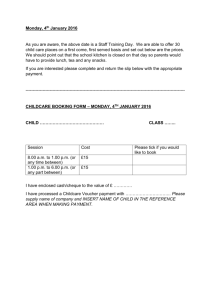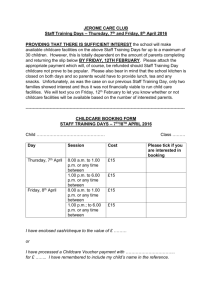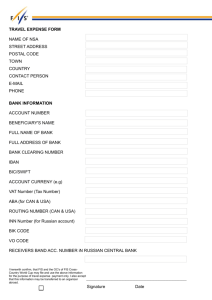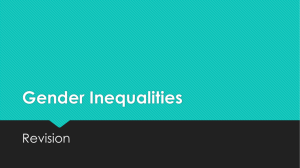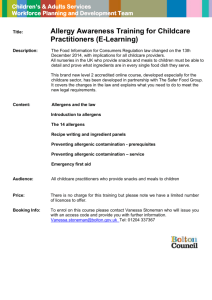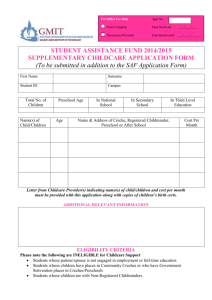Continuing to improve in a climate of austerity
advertisement
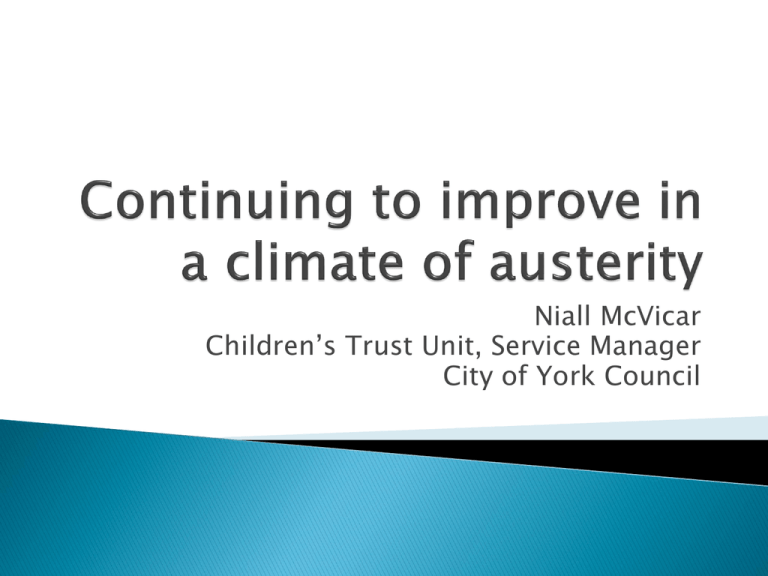
Niall McVicar Children’s Trust Unit, Service Manager City of York Council A little bit of history... The age of austerity Continuous improvement ◦ Quality ◦ Culture Your strategic triangle ◦ Identifying and taking opportunities Challenges Studied Physics at the University of York I became manager of the Children’s Information Service in 2005 ◦ ◦ ◦ ◦ Okay service, not much continuous improvement Parkinson’s law in action Doing things we have always done Lots of potential Chair of the National Association of Family Information Services since 2013 National Childcare Strategy A significant cultural shift in how government viewed and interacted with childcare Driven by a desire to: ◦ Remove barriers to families working ◦ Reduce child poverty Children’s Information Services formed ◦ National CIS strategy 2003-2006 ◦ Aim to provide families with information about local childcare Family Information Services formed ◦ Childcare Act 2006 – Duty 12 ◦ Aim to provide Childcare information Any service which could help a parent in their role Universal Emerging Complex The age of austerity has polarised the picture of FIS across the UK. Magnified the differences between areas. What factors have caused this polarisation? ◦ Those that have been most successful: Were good quality Already had a well established culture of continuous improvement Had good “buy in” locally Outcomes Awareness / Collaboration Quality What are we actually trying to achieve? How will we know if we are being successful? Any enquirer who receives information from us gets and evaluation form two weeks after they have used us. Open to positive and negative feedback. I see all completed evaluations. Longer term impact studies once every couple of years. ◦ Looking at impact six to 18 months down the line. Measuring impact from the perspective of practitioners. National Association of Family Information Services – Families First Quality Award Outcomes User feedback ◦ ◦ ◦ ◦ Parents / carers Partners Managers Councillors Clients know how LA information services can help them Clients have the information they need to make informed and realistic decisions about services available Clients are enabled to access the service FIS promote equality of opportunity, celebrate diversity and challenge stereotypes Information professionals understand their individual roles and responsibilities Staff providing IAG are appropriately trained and qualified and participate in CPD Services are planned, monitored, reviewed and evaluated and actions taken to improve services and meet needs Information is effectively managed and quality assured FIS will encourage and guide those who may not otherwise access services on their own Partnership working is effective offering seamless and effective support In 2005 I needed to establish a culture of continuous improvement within the team. ◦ ◦ ◦ ◦ Participative management Adaptive leadership Self reflection Sharing in our successes Focussed on: ◦ Making processes as efficient as possible ◦ How to best deliver the outcomes we were aiming for ◦ Telling our story Looking across other Family Information Services. ◦ National Association of Family Information Services Community of practice ◦ NAFIS list ◦ NAFIS Conference ◦ Regional network Being open to working with others collaboratively. No better example of the polarisation of FIS than channel shift. Principal is one everyone can agree on. ◦ Get people to use cheaper channels to access the information. Universal versus “progressive universal” Universal Emerging Complex Basic website information. No real back up or additional support. Fractured support from wider world of children’s services. No clear understanding of outcomes or how these would be measured. YorOK website launched November 2007 Extensive engagement with range of potential users Continuous development lead by the service. Integration of the website as a source of information into other processes. Backed up by information officers within the service. Information officer role developed into projects development and specialism's. National project lead by the Family and Childcare Trust. Developing models of parent champion volunteers. Understood power of informal and formal sources of information. Brings those together to work in partnership. Big improvement in access to information for families. Massive impact for volunteers. A number of FIS have made excellent use of social media. Initial use as a broadcast tool. Developed further as a channel for families to access the service. ◦ Greater uptake by dads. Virtual champions ◦ Existing parent led groups. “We need a directory of...” Strong FIS had developed robust process and infrastructure. Potential to support wider agendas: ◦ ◦ ◦ ◦ ◦ Youth offer Local offer Community childcare hubs Care act Etc etc FIS sit on an incredible range of information. Awareness amongst families still relatively low. Many partners want to make use of this data. Publish it under and open government license. ◦ Web service ◦ Widget Childcare Bill 2015 – Queen’s speech Outcomes Awareness / Collaboration Quality Public Value Proposition Operational Capability Authorising Environment “Government managers secure the resources they need to operate not by selling products and services to individual customers, but by selling a story of public value creation to elected representatives of the people in legislatures and executive branch positions.” Moore, Creating public value Our public value proposition was principally set nationally but our authorising environment is local. Nationally ◦ Improve access to childcare ◦ Reduce child poverty ◦ An element of early help/intervention Locally? ◦ Doing it because they have to? ◦ Can key partners see the public value proposition? ◦ Can key partners see the possibility of creating further public value? Public Value Proposition Operational Capability Authorising Environment Niall McVicar ◦ niall.mcvicar@york.gov.uk ◦ 01904 554440

